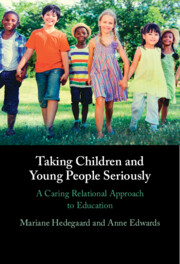Book contents
- Taking Children and Young People Seriously
- Taking Children and Young People Seriously
- Copyright page
- Contents
- Figures
- Tables
- Chapter 1 Taking Children and Young People Seriously
- Chapter 2 A Cultural-Historical Approach to Children’s Development and Childhood
- Chapter 3 Working Relationally with Other Professionals and Families
- Chapter 4 Very Young Children
- Chapter 5 Care and Education in Kindergarten with Play as the Core Activity
- Chapter 6 Engaging with Knowledge When Starting School
- Chapter 7 Caring Approaches to Pedagogy
- Chapter 8 The Primary School Age
- Chapter 9 Developmental Teaching as a Double Move between Subject Knowledge and Children’s Appropriation of Personal Knowledge
- Chapter 10 Adolescence and Transitions into Early Adulthood
- Chapter 11 A Caring Relational Approach to Education
- References
- Index
Chapter 10 - Adolescence and Transitions into Early Adulthood
Published online by Cambridge University Press: 08 June 2023
- Taking Children and Young People Seriously
- Taking Children and Young People Seriously
- Copyright page
- Contents
- Figures
- Tables
- Chapter 1 Taking Children and Young People Seriously
- Chapter 2 A Cultural-Historical Approach to Children’s Development and Childhood
- Chapter 3 Working Relationally with Other Professionals and Families
- Chapter 4 Very Young Children
- Chapter 5 Care and Education in Kindergarten with Play as the Core Activity
- Chapter 6 Engaging with Knowledge When Starting School
- Chapter 7 Caring Approaches to Pedagogy
- Chapter 8 The Primary School Age
- Chapter 9 Developmental Teaching as a Double Move between Subject Knowledge and Children’s Appropriation of Personal Knowledge
- Chapter 10 Adolescence and Transitions into Early Adulthood
- Chapter 11 A Caring Relational Approach to Education
- References
- Index
Summary
In this chapter, we discuss adolescence as a period of imaginative future-making, where identities are in flux and worked on, and self-consciousness enhanced. We draw on Vygotsky to argue that the conceptual thinking that marks adolescence enables them to closely analyze current realities, see connections they had not previously recognized, and grapple with complexities. These capabilities also allow adolescents to look beyond their immediate surroundings and become actively responsible citizens. Conceptual thinking therefore needs nurturing in environments that present meaningful challenges, offer the resources that can help young people tackle them and recognize the role of emotion in conceptual development. We explain how a relational approach can help young people with the development of identities that can engage them with what society offers. We also show how a relational pedagogy, including the use of digital resources, can sustain students as they tackle the curricular demands of high school, including subject matter knowledge. We point to the potential importance of families in supporting young people in the transition to adulthood and conclude by discussing efforts framed by cultural-historical understandings at supporting this transition for vulnerable young people.
Keywords
- Type
- Chapter
- Information
- Taking Children and Young People SeriouslyA Caring Relational Approach to Education, pp. 236 - 261Publisher: Cambridge University PressPrint publication year: 2023



